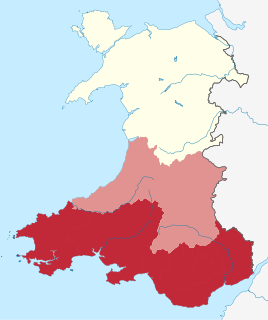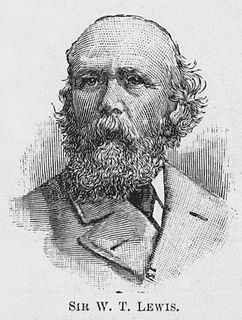Related Research Articles

Aberdare is a town in the Cynon Valley area of Rhondda Cynon Taf, Wales, at the confluence of the Rivers Dare (Dâr) and Cynon. Aberdare has a population of 39,550. Aberdare is 4 miles (6 km) south-west of Merthyr Tydfil, 20 miles (32 km) north-west of Cardiff and 22 miles (35 km) east-north-east of Swansea. During the 19th century it became a thriving industrial settlement, which was also notable for the vitality of its cultural life and as an important publishing centre.

Brecknockshire, also known as the County of Brecknock, Breconshire, or the County of Brecon is one of thirteen historic counties of Wales, and a former administrative county. Named after its county town of Brecon, the county is mountainous and primarily rural.

David Davies was a Welsh industrialist and Liberal politician who sat in the House of Commons between 1874 and 1886. Davies was often known as David Davies Llandinam. He is best remembered today for founding Barry Docks.

South Wales is a loosely defined region of Wales bordered by England to the east and mid Wales to the north. It has a population of around 2.2 million, almost three-quarters of the whole of Wales, including 400,000 in Cardiff, 250,000 in Swansea and 150,000 in Newport. Generally considered to include the historic counties of Glamorgan and Monmouthshire, south Wales extends westwards to include Carmarthenshire and Pembrokeshire. In the western extent, from Swansea westwards, local people would probably recognise that they lived in both south Wales and west Wales. The Brecon Beacons National Park covers about a third of south Wales, containing Pen y Fan, the highest British mountain south of Cadair Idris in Snowdonia.

Abercynon, is both a village and a community in the Cynon Valley within the unitary authority of Rhondda Cynon Taf, Wales. The community comprises the village and the districts of Carnetown and Grovers Field to the south, Navigation Park to the east, and Glancynon to the north.

Ynyshir is a village and community located in the Rhondda Valley, within Rhondda Cynon Taf, South Wales. Ynyshir is pronounced (ənɪs-hiːr) according to the International Phonetic Alphabet (IPA), and means "long island" in Welsh. The village takes its name from a farm in the area, falling within the historic parishes of Ystradyfodwg and Llanwynno (Llanwonno). The community of Ynyshir lies between the small adjoining village of Wattstown and the larger town of neighbouring Porth.

Cwmdare is a village very close to Aberdare, in Rhondda Cynon Taf, Wales. The village's history is intertwined with coal-mining, and since the decline of the industry in the 1980s, it has become primarily a commuter base for the larger surrounding towns of Aberdare and Merthyr Tydfil and Pontypridd, as well as the cities of Cardiff and Swansea.

William Thomas Lewis, 1st Baron Merthyr, known as Sir William Lewis, 1st Baronet, from 1896 to 1911, was a Welsh coal mining magnate.
This article is about the particular significance of the year 1880 to Wales and its people.
This article is about the particular significance of the year 1842 to Wales and its people.
This article is about the particular significance of the year 1784 to Wales and its people.
Maerdy Colliery was a coal mine located in the South Wales village of Maerdy, in the Rhondda Valley, located in the county borough of Rhondda Cynon Taf, and within the historic county boundaries of Glamorgan, Wales. Opened in 1875, it closed in December 1990.
Bwllfa Colliery was a coal mine located in the Dare valley near Cwmdare in Rhondda Cynon Taf, South Wales. It operated from 1856 to 1957, remaining open as a ventilation shaft for Mardy Colliery until 1989.
Thomas Price was a leading figure in the political and religious life of Victorian Wales and minister of Calfaria Baptist Chapel, Aberdare.
The Brecon by-election of February 1866 was held on 27 February 1866. The by-election arose following the death of the previous Liberal MP, John Lloyd Vaughan Watkins.

Thomas Thomas was a Welsh church minister and chapel architect, also known as Thomas Glandŵr. He is described as "the first national architect of Wales" and the "unchallenged master of chapel architecture in Wales in the 1860s".
Hopkin Bevan (1765–1839) was a Calvinist Methodist minister and writer.
The Risca colliery disasters were a series of catastrophic mine explosions near the Welsh town of Risca in the nineteenth century. The most serious of these were in 1860 when more than 140 died in the Black Vein colliery and in 1880 when 120 died at the New Risca colliery.

George Insole was an English entrepreneur who built an extensive coal mining and shipping business in South Wales.

David Watkin Jones, also known by his bardic name Dafydd Morganwg(sic), was a Welsh poet, historian and geologist. He is remembered as the author of numerous works, especially Yr Ysgol Farddol, considered by many later poets as the main text for Welsh prosody.
References
- Theophilus Jones, History of the County of Brecknock (Glanusk edition), iv, 257, 297, 309
- Elizabeth Phillips, A History of the Pioneers of the Welsh Coalfield, 1925, 205–7, 249